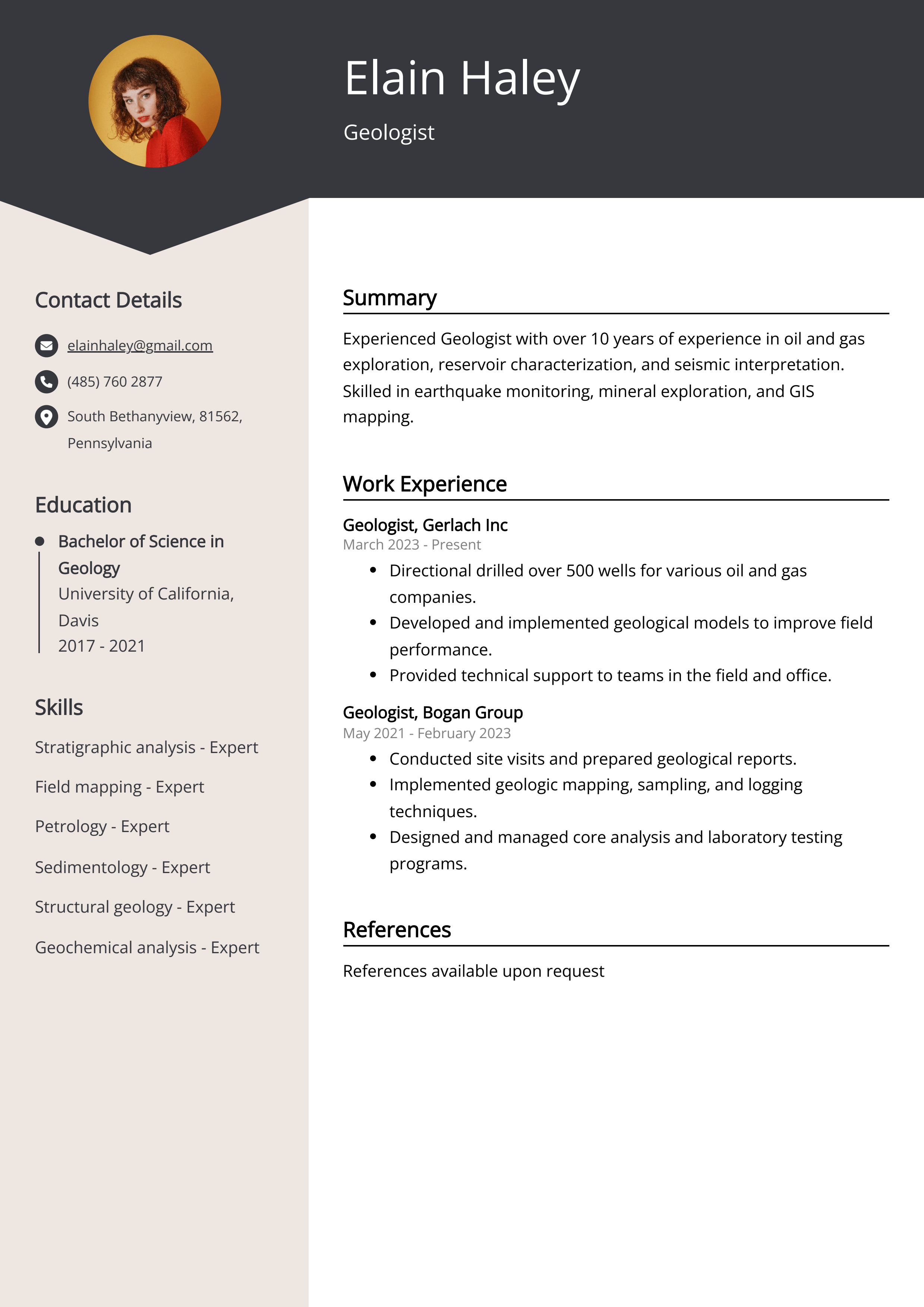

![]()
![]()
![]()
![]()
![]()

This article provides an example of a geologist resume that is sure to get you noticed. It provides step-by-step instructions on how to create a resume that stands out in the industry and highlights your unique skills and experience. It also provides tips and advice on how to ensure your resume is as effective as possible to help you land the job you want.
A geologist studies the physical structure and composition of the Earth, including rocks, minerals, and other materials. They use scientific methods to examine and interpret geological data to gain an understanding of the Earth's history and to predict future geological changes. Geologists may specialize in a specific area, such as geochemistry, geophysics, or paleontology. They may also work in the oil and gas industry, mining industry, or in government and private research institutions.
Geologist
Personal Details:
Name: John Doe
Address: 123 Main Street, Anytown, ST 12345
Phone: (123) 456-7890
Email: john.doe@example.com
John Doe is an experienced Geologist with over 10 years of experience in mineralogy and sedimentology. He has worked on a variety of projects, ranging from basic mapping and exploration to advanced research. John is an excellent communicator and has a strong understanding of geological principles and processes. He is a reliable and highly sought-after geoscientist who is committed to providing quality results and customer satisfaction.
Work Experience:
Education:
Skills:
Certifications:
Languages:
English (native)
Creating a perfect, career-launching resume is no easy task. Following general writing rules can help, but it is also smart to get advice tailored to your specific job search. When you’re new to the employment world, you need Geologist resume tips.
We collected the best tips from seasoned Geologist - Check out their advice to not only make your writing process easier but also increase your chances of creating a resume that piques the interest of prospective employers.
A Geologist Resume Summary or Resume Objective is important to include when applying for a job in the geology field. It gives an employer a quick summary of your qualifications and skills, and can help you stand out amongst other applicants. By being concise and making sure to include keywords from the job posting, the summary or objective can help you make a great first impression and show potential employers why you are the best candidate for the job.
Having a strong experience section on a geologist resume is essential for demonstrating your capabilities and expertise in the field. It will show potential employers that you have the technical understanding and the ability to apply it in real-world scenarios. It will also show that you have the necessary field experience and can handle a variety of tasks and situations. Additionally, it can help employers understand how you think and how you approach problems. Having a strong experience section on your resume can help you stand out from the competition and demonstrate that you are the right person for the job.
A Geologist typically needs at least a Bachelor's degree in Geology or a related field such as Earth Science or Geophysics. In addition, most employers require experience in the field, such as field work or laboratory research. Some jobs may also require a Master's degree or higher.
Here is an example of an experience listing suitable for a Geologist resume:
Adding skills to a Geologist Resume is important in order to demonstrate your expertise and knowledge in the field. Skills should be tailored to the job position you are applying for, and should include knowledge of geological processes, field mapping techniques, geophysical surveying, geochemistry, mineralogy, and petrology. Additionally, skills in computer software like AutoCAD, GIS, and ArcGIS, as well as laboratory techniques, are important to demonstrate. By including these skills, you can demonstrate your qualifications and experience in the field, making you a more attractive candidate to potential employers.
In this competitive job market, employers receive an average of 180 applications for each open position. To process these resumes, companies often rely on automated applicant tracking systems, which can sift through resumes and eliminate the least qualified applicants. If your resume is among the few that make it past these bots, it must still impress the recruiter or hiring manager. With so many applications coming in, recruiters typically give each resume only 5 seconds of their attention before deciding whether to discard it. Considering this, it's best to avoid including any distracting information on your application that could cause it to be thrown away. To help make sure your resume stands out, review the list below of what you should not include on your job application.
It's time to begin the job search. Make sure you put your best foot forward and land your next job with the help of Resumaker.ai.